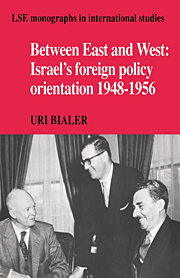Book contents
- Frontmatter
- Contents
- Acknowledgments
- INTRODUCTION
- Part I THE INTERNAL DIMENSION
- Part II RED STAR OVER ZION
- Part III THE WESTERN CONNECTION
- EPILOGUE: “A people that dwells alone”?
- Appendix 1 U.N. voting record
- Appendix 2 Biographical notes
- Appendix 3 Israel's votes at the U.N.
- Index
- LSE MONOGRAPHS IN INTERNATIONAL STUDIES
EPILOGUE: “A people that dwells alone”?
Published online by Cambridge University Press: 24 November 2009
- Frontmatter
- Contents
- Acknowledgments
- INTRODUCTION
- Part I THE INTERNAL DIMENSION
- Part II RED STAR OVER ZION
- Part III THE WESTERN CONNECTION
- EPILOGUE: “A people that dwells alone”?
- Appendix 1 U.N. voting record
- Appendix 2 Biographical notes
- Appendix 3 Israel's votes at the U.N.
- Index
- LSE MONOGRAPHS IN INTERNATIONAL STUDIES
Summary
In the course of several meetings with Israelis in mid-1954, American officials in both Washington and Jerusalem queried the true extent of Israel's adherence to the Western bloc. Policy-makers in Jerusalem considered this effort “to paint Israel red” a grave danger and, in order to prepare appropriate counter-measures, ordered a thorough analysis of its possible causes. That instruction produced a report which presents a fascinating summary of the broad issues affecting Israel's foreign policy orientation during the first half-decade of the state's existence. The work of a team headed by Isser Halperin (later Harel), the highly influential chief of the Internal Security Service (Shin Beth), the document analyzed with admirable clarity the rationale and manifestations of Israel's efforts to achieve special relationships with both East and West and the limitations of those efforts. Now, an entire generation later, it is possible to review the material again and to attempt an independent retrospective résumé of the various conflicting pressures which affected Israel's actions during the period of the cold war.
As we have seen, the accusations voiced by the Americans in 1954 were without any foundation whatsoever. By then, Israel had clearly formulated a foreign policy which was distinctly pro-Western – even if not formally and explicitly so. Her choice had been determined by both positive and negative considerations. Primary among the latter was the absence of a peace treaty with her Arab neighbors. The fatalistic realization that inveterate Arab hostility to her very existence would long remain a fact of Israeli life was reinforced by the failure to reach a peace treaty with Jordan in the early 1950s; it was confirmed by the behavior of Arab representatives at the U.N.
- Type
- Chapter
- Information
- Between East and WestIsrael's Foreign Policy Orientation 1948–1956, pp. 276 - 281Publisher: Cambridge University PressPrint publication year: 1990



